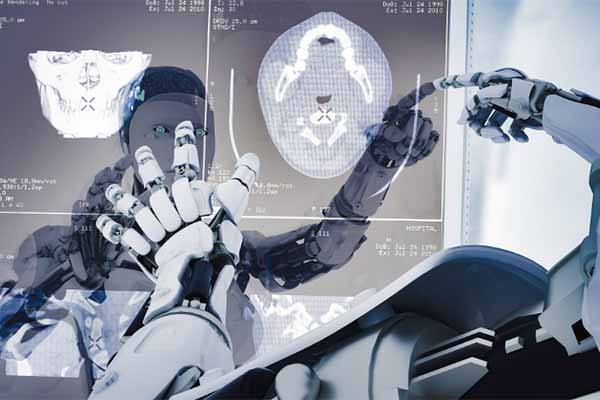Artificial Intelligence (AI) is transforming various industries, and the healthcare sector is no exception. The AI market is expected to increase at a rate of about 32% in the coming years and will continue to revolutionize various sectors, including the healthcare industry by improving the quality of patient care, reducing costs, and increasing efficiency.
From chronic diseases, such as cancer, to radiology, AI is being leveraged to create precise and efficient inventions which will aid in the care of those suffering from these illnesses and possibly discover a cure. AI offers several advantages over traditional methods of analytics and making clinical decisions.
Here are some ways in which AI can help in the healthcare industry:
- Medical Imaging: AI-powered medical imaging technologies can help doctors diagnose diseases more accurately and quickly. For example, AI can analyze images from CT scans and X-rays to identify abnormalities and tumors that may not be visible to the naked eye. It can also assist in the early detection of diseases like cancer.
- Personalized Treatment Plans: AI can help create personalized treatment plans for patients based on their medical history, genetics, and lifestyle. By analyzing vast amounts of data, AI can identify patterns and develop treatment plans tailored to individual patient needs.
- Drug Discovery: Developing new drugs is a time-consuming and expensive process. AI can help speed up the process by analyzing vast amounts of data to identify potential drug candidates. It can also help predict how effective a drug will be based on the patient’s genetic makeup.
- Predictive Analytics: AI can help predict patient outcomes by analyzing large amounts of patient data. It can also identify patients who are at risk of developing certain conditions, allowing doctors to intervene before the condition becomes severe.
- Medical Chatbots: AI-powered chatbots can help patients get answers to their medical questions quickly and efficiently. Chatbots can also help patients schedule appointments and connect with doctors.
- Virtual Nursing Assistants: AI-powered virtual nursing assistants can help patients manage their chronic conditions by providing reminders to take medication, tracking their symptoms, and answering questions.
- Administrative Tasks: AI can help healthcare organizations streamline administrative tasks, such as scheduling appointments and managing medical records. This can liberate time for healthcare providers to focus on patient care.
AI Healthcare Market Size
AI in healthcare was estimated by $9 billion by 2020. The market is expected to grow to $190 billion in 2030 and by a CAGR of 40% from 2019 to 2028. The rapid growth of artificial intelligence in healthcare market is primarily caused by an increased quantity of health data and an increase in the complexity of data sources, which has led to the need for AI in the healthcare market.
Furthermore, advancements in the power of computers and the reduction in the cost of hardware, the increase in the number of cross-industry collaborations, partnerships, and the rise of an imbalance in the healthcare workforce and patients drive the need for improved healthcare services.
Future of AI in Healthcare
Soon in future, AI will enable the next generation of radio tools that are precise enough to substitute for tissue samples in certain situations. This could help healthcare providers better define the extent of cancer’s severity and help target treatments more effectively. AI can also facilitate “virtual biopsies” and advance the field of radiomics with its innovative approach.
Additionally, electronic health records can aid in identifying those at risk and help identify infections before they manifest symptoms. Using the power of machine learning and AI tools to support these analytics can produce faster, more precise warnings for healthcare providers. AI can also offer earlier warnings of conditions such as sepsis or seizures, usually needing intensive analysis of complicated data sets.
Utilizing AI to score risk, clinical decision support, and early warning are a few major areas of development in this groundbreaking method. AI is set to usher in a new age of high-quality clinical care and thrilling breakthroughs in healthcare.
Conclusion
AI has the potential to transform the healthcare industry by improving patient care, reducing costs, and increasing efficiency. While there are still challenges to overcome, such as data privacy and regulatory compliance, the benefits of AI in healthcare are significant and cannot be ignored. RationalStat’s market research analysis can help you grow in the healthcare industry by providing insightful market research report.















